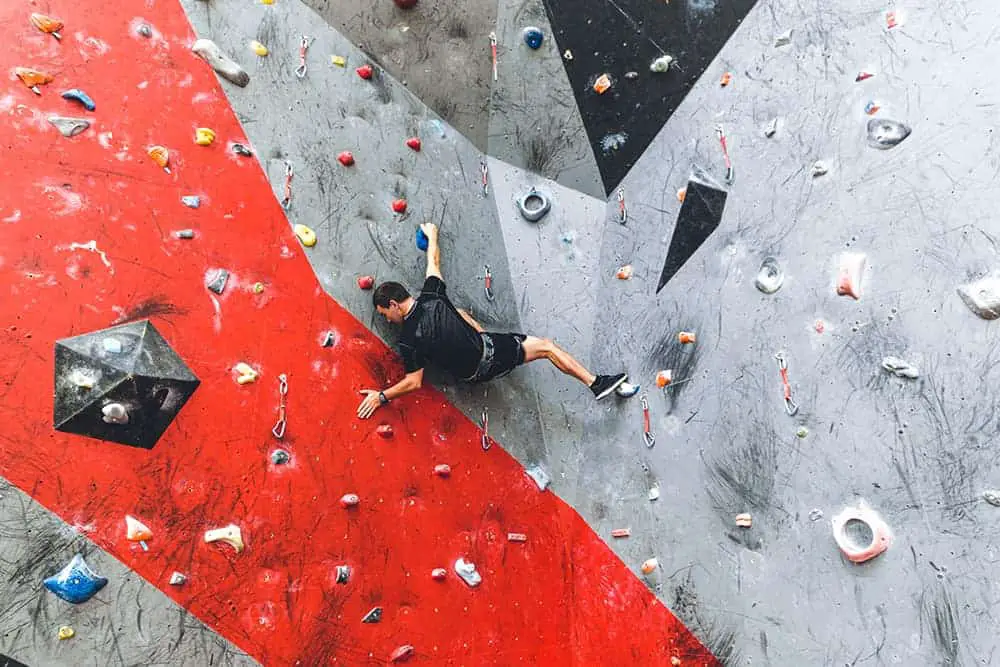The fear of falling is something that every climber has to deal with. It can prevent climbers from pushing harder or taking risks and it can prevent climbers from sending the problem. You only need to spend a few moments in the climbing community before you learn that everyone goes through it.
With the fear of falling being such a prevalent concern, you may be wondering how to deal with the fear of falling.
There is no short recommendation or a mantra that will “heal” your fear of falling, but this article will go through what experts in the field recommend for working through your fear of falling.
Why Do We Fear Falling?
The fear of falling has been bred into us from the beginning of mankind. People who feared falling were less likely to go to the edge of a cliff or risk getting up high and risk falling to their death, thus through evolution, we learned to fear falling to increase our chances of survival. This suggests that the fear of falling isn’t an irrational fear and should be considered a healthy human instinct depending on how it affects your climbing.
Some people fear falling more than others, especially people that have experienced injury due to a fall.
This fear changes how we climb and even influences our decision to climb.
How Fear Of Falling Affects Our Climbing
Many climbers associate the fear of falling with freezing on a route or climbing down before you reach the top. Though these are associated with the fear of falling, it also affects us in many other ways. Mental challenges can make difficult sections seem impossible to complete, no matter how much physical training and technique training you have.
Below are a few of the most common effects that experts have associated with the fear of falling:
Over Gripping
As noted in Don McGrath and Jeff Elison’s book, Vertical Mind. When a climber is afraid to fall, they are more likely to overgrip. This not only increases the amount of energy they are using throughout the climb, it also increases your chances of injury.
Lack of Flow
Flow is commonly attributed to when climbers feel the most confident climbing and are able to make the most improvement. While in flow, climbers are able to focus on the physical and mental attributes of the climb and they create a euphoric zen-like sense while doing it. Being able to bump into flow is an essential skill for climbing hard routes.
If you are concentrating on “not falling” or “staying safe” then you are unlikely to achieve this zen-like sense of flow or the benefit of growing better as a climber.
Lack of Progress
Progress not only refers to your ability to progress through a single climb, it also refers to your progress as a climber overall.
If you are concerned about falling, you are less likely to take the chance or risk necessary for improving your strength, hand-eye coordination, or technique needed to progress in climbing.
Self Depreciation or Frustration
Often times when climbers recognize their fear of falling as a reason why they aren’t progressing, they become frustrated with themselves and often communicate negative feelings of themselves to themselves.
This self-depreciation and frustration can interrupt the enjoyment of climbing and can even prevent someone from being able to achieve their goals.
How To Work Past The Fear Of Falling
A while back, I fell and split my chin open. The ordeal caused a lot of pain and grief, which made my fear of falling more prevalent than before, not to mention a life-changing accident that happened years before.
When this happened, I started to look for ways to get past my fear of falling so that I could “get back to how it used to be.”
What I learned was that many climbers spend years “overcoming” their fear of falling only to later learn that the fear was always there, they just learned to keep climbing despite the fear.
Because of this, I considered that focusing on “overcoming” the fear of falling and working through it may not even be possible. It is, after all, a fear that preserves the basic nature of our entire body, to stay alive.
With that realization, I decided to review what climbers, psychologists, and other experts recommend for being able to perform while dealing with the fear of falling and what mental training tools they use that seem to work for them.
Below are a few of the ways that stood out to me the most.
Focus On The Effect, Not The Fear
The most helpful information I found was from Vertical Mind, a book that I highly recommend any climber reads (or listens to on Audible).
Instead of focusing on getting passed or over my fear of falling, a fear that is literally part of my DNA, consider focusing on the effects of my fear.
For example, when I am afraid of falling, I often overgrip.
Instead of telling myself that the height or falling is ok, I’d focus on reviewing my grip and adjusting it for optimal performance. This is also something you can do as a climbing partner. As the belayer or climbing partner, you can see when the climber is struggling and you can mention things like review your grip to be the most helpful.
This not only took my focus off of falling, but it also helped me learn ques that I should review and focus on my grip.
Focus On Progress
Often times we associate success with completing a climb or getting to the next grade in climbing. However, we should associate success with progress.
Not only will focusing on progress instead of completing the climb help us get better at climbing and feel more accomplished, it may also help us with our fear of falling.
When you start to notice your fear of falling, instead of looking at the top of the climb or looking down for minimizing injury, consider focusing on making it to the next hold.
By getting to the next hold, you are able to accomplish success, which is progress.
That sense of accomplishment can overpower your fear of falling and may even refocus on the problem at hand, getting to the next hold. And then the next. And then the next.
Breathe
Many studies suggest that controlling your breath can be the key to reducing anxiety and calming yourself. Can you imagine how powerful it would be to recognize you are afraid and then to take a moment to breathe and feel better again?
I read a few recommended breathing exercises while studying for this article but one stood out to me. It’s a poem that seems easy to remember and the first time I read it, I immediately felt calm and confident. A sensation I wasn’t expecting and I decided to share it with you.
In, out.
Deep, slow.
Calm, ease.
Smile, release.
Present moment,
Wonderful moment.
Everyone has the fear of falling to some degree (literally everyone). It is something that as climbers, we may notice your fear interferes with our performance.
However, instead of focusing on your fear, consider climbing despite that fear. You can do this by focusing on the consequences or symptoms of your fear and then also consider rewiring your mind to respond to the fear differently. If your fear continues to challenge your ability to complete the routes, then it may be worth reaching out to experts on teaching falling and having a background in climbing psychology.
Eventually, our minds will respond differently (like how Alex Honnold’s brain reacts to the fear of falling) and we will be able to climb as though we don’t have a fear of falling.
More About Training for Climbing:
- How To Climb More Often Without Getting Injured | Tried And Tested Methods For Recovery
- Lower Body Mobility And Flexibility Challenge
- Neglected Techniques Necessary For V4-V5 Progression
- 17 Footwork Drills For Climbing
- Mental Training For Climbing
- How Often And Hard Should You Climb To Get Gains?
- When Should You Start Hangboarding For Boulder’s
- Is Bouldering When Sore Bad?
- The Top 22 Climbing Techniques And Skills And How To Do Them
- 23 Tips For Climbing Slabs
- When To Flag In Climbing And How-To-Do It (With Videos)
- How To Learn Climbing Technique For Beginners
- What Should You Record In A Climbing Journal?
- Climbing Endurance: Muscle, Skin And Mental Training
- How To Deal With Fear Of Falling
- How Many Days Should You Climb Per Week?
- 5-10 Minute Warm-Up For Climbing
- What Is A Dyno And How To Do It
- What Is A Gaston In Climbing? Powerful Moves For Beginners
- Can Foam Rolling Improve Rock Climbing Performance?
- 7 Things Climbers Should Do On Rest Days For Better Performance
- When Do You Need A Rest Day?
- How To Climb Your Best – Pros And Cons Of Rest Days
- Static Vs Dynamic Climbing Movement: Pros And Cons
- 5 Habits For Healthy Climbing That You Haven’t Thought Of
- 5 Things To Improve Climbing Performance And Sustainability
- 10 Minute Workout Routines For Post Climbing Sessions
- How To Use Climbing Holds: Techniques For Improved Climbing
- A Guide For Climbers: Bouldering Drills 101
- 12 Easy Workouts To Increase Hand And Grip Strength For Climbers
- What Are Undercling Climbing Holds And Why Climbers Love/Hate Them
- What Is A Crimp In Rock Climbing And How To Train For Them
- 7 Common Mistakes in Rock Climbing For Beginners

